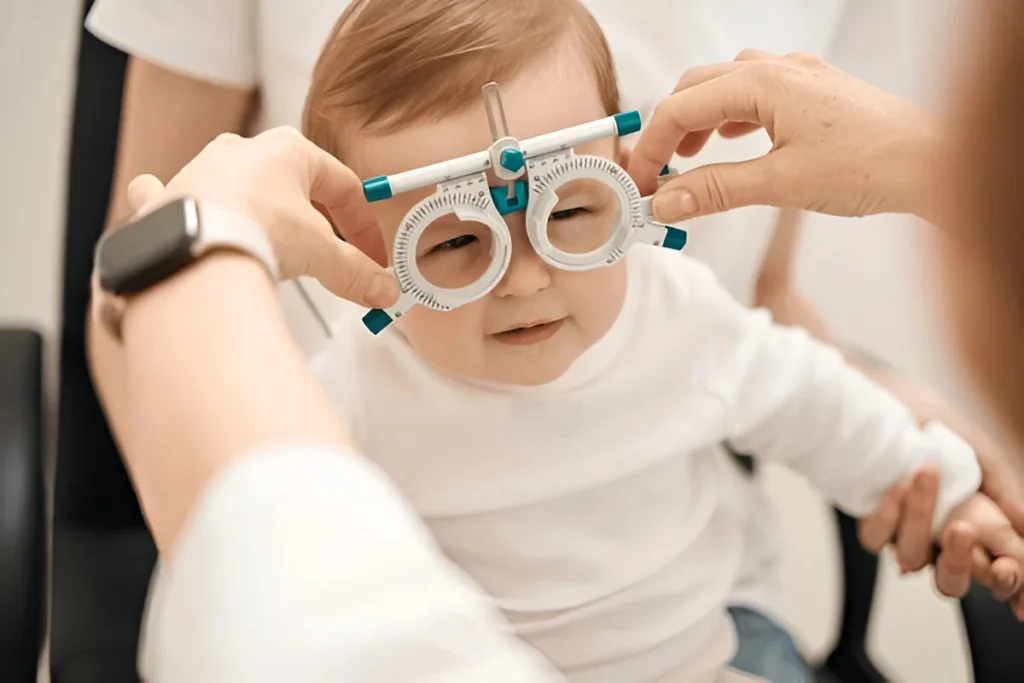Vision problems in premature babies can be prevented or treated with early care. Consult a reputed eye surgeon for expert guidance and timely treatment.
Premature birth can bring many challenges, one of the most concerning being vision-related complications. While advances in neonatal care have improved survival rates, premature babies remain at higher risk for a range of eye conditions. Parents often find themselves anxious, wondering why their child might face such problems and what can be done about them.
Understanding the causes, risk factors, and early interventions for vision problems in premature babies is essential to ensure better eye health outcomes.
Why Premature Babies Face Higher Eye Risks
A baby’s eyes, like other organs, continue to develop throughout pregnancy. When a baby is born too early, this natural growth process is interrupted. As a result, the delicate structures of the eyes may not form completely, leading to potential complications.
Some of the key reasons include:
- Incomplete retinal development – The retina, crucial for vision, may not fully develop in premature infants.
- Immature optic nerve connections – Communication between the eyes and the brain may be underdeveloped.
- Fragile blood vessels – Incomplete blood vessel growth in the eyes can lead to disorders such as Retinopathy of Prematurity (ROP).
- Associated health conditions – Premature babies may face breathing issues, infections, or low birth weight, which indirectly affect vision health.

Common Vision Problems in Premature Babies
Retinopathy of Prematurity (ROP)
One of the most common concerns, ROP occurs when abnormal blood vessels grow in the retina. In severe cases, it can cause scarring, retinal detachment, and even blindness.
Strabismus (Crossed Eyes)
Premature infants are more likely to have strabismus, a condition where the eyes do not align properly. This can affect depth perception and overall vision.
Refractive Errors
Nearsightedness (myopia), farsightedness (hyperopia), and astigmatism are often found in children born prematurely. These errors affect how clearly they see objects at different distances.
Amblyopia (Lazy Eye)
If one eye is weaker or not aligned correctly, the brain may start ignoring signals from it, leading to amblyopia.
Cortical Visual Impairment (CVI)
In some cases, the issue lies in the brain rather than the eyes. Babies born prematurely can develop CVI, where the brain struggles to interpret visual information correctly.
Key Risk Factors for Vision Problems in Premature Babies
The likelihood of vision complications is influenced by multiple factors:
- Very low birth weight (less than 1500 grams)
- Early gestational age (before 32 weeks)
- Extended oxygen therapy in NICU
- Infections and sepsis
- Family history of eye conditions
- Neurological complications during birth
Early Signs Parents Should Look Out For
Detecting problems early gives a baby the best chance of treatment and recovery. Some signs that may indicate vision issues include:
- Lack of eye contact after 6–8 weeks of age
- Constant eye crossing or wandering
- Sensitivity to light
- Delayed visual milestones, like following objects
- White pupils or unusual eye reflections in photos
If any of these symptoms appear, parents should seek immediate medical advice.

How Specialists Diagnose Eye Conditions in Premature Babies
Eye screenings are essential for premature infants, typically starting a few weeks after birth. Ophthalmologists use specialized techniques to examine the retina, optic nerve, and overall eye development.
Some diagnostic methods include:
- Indirect ophthalmoscopy – for detailed retina checks
- Ultrasound imaging – for deeper eye structure analysis
- Visual response tests – to assess how the baby reacts to light and movement
- Neuro-ophthalmic evaluation – if brain-related vision issues are suspected
Treatment and Management Options
Not all vision problems in premature babies lead to permanent damage. With timely care, many conditions can be managed effectively.
Treatment options include:
- Laser therapy or cryotherapy – for severe ROP cases
- Corrective lenses (glasses or contact lenses) – for refractive errors
- Eye patching – to strengthen a weaker eye in amblyopia
- Surgical correction – for severe strabismus or retinal detachment
- Vision therapy and rehabilitation – for developmental visual delays
Preventive Measures for Parents
While not all cases can be prevented, certain steps help lower the risks:
- Ensuring regular neonatal checkups
- Following up with specialist eye examinations at scheduled intervals
- Avoiding unnecessary oxygen exposure in NICU
- Monitoring nutritional support for proper growth
- Staying alert for early warning signs of eye problems
The Role of Experts in Managing Vision Problems
Premature babies require multidisciplinary care involving neonatologists, pediatricians, and ophthalmologists. Choosing an experienced eye specialist is critical to ensuring accurate diagnosis and safe treatment.
Parents in metropolitan cities often seek the Best Eye Surgeon in Kolkata, as access to advanced facilities and expertise can make a life-changing difference. With the right guidance, many children go on to enjoy healthy vision despite early challenges.

FAQs on Vision Problems in Premature Babies
Q1. Do all premature babies develop eye problems?
No, but they are at higher risk compared to full-term babies. Regular screenings help detect issues early.
Q2. When should eye exams begin for premature infants?
Typically between 4–6 weeks after birth, depending on gestational age and health status.
Q3. Can vision problems in premature babies be corrected completely?
Yes, many issues such as refractive errors or strabismus can be managed with glasses, therapy, or minor surgery.
Q4. Is Retinopathy of Prematurity always serious?
Not always. Mild ROP often resolves naturally, but severe cases need medical intervention.
Q5. How important is early intervention?
Extremely important. The earlier an eye condition is diagnosed, the higher the chances of effective treatment.
Ensuring Healthy Vision in Premature Babies with Expert Care
Premature birth can disrupt natural eye development, leading to conditions like ROP, strabismus, and refractive errors. Recognizing the causes and risk factors behind vision problems in premature babies is vital for timely intervention.
With proper medical support, regular screenings, and expert guidance, most children can overcome these early hurdles and enjoy healthy vision. Seeking advice from specialists, especially renowned experts such as Dr. Tanmoy Biswas, ensures that every child receives the best possible eye care from the very beginning.

